|
|
|
Sort Order |
|
|
|
Items / Page
|
|
|
|
|
|
|
| Srl | Item |
| 1 |
ID:
142481
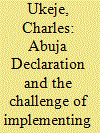

|
|
|
|
|
| Summary/Abstract |
Over the past two decades, the significance of the Gulf of Guinea and the wider South Atlantic Ocean has become incontrovertible in view of the spectrum of geo-strategic interests – commercial, energy, military, security and political – converging within the zone. Due to its vastness and lack of capacity to exercise adequate writby littoral states, the maritime landscape have become some of the most dangerous in the world: with frequent incidences of piracy, oil bunkering, trafficking in persons, weapons, illicit drugs and fake pharmaceutics, and criminal activities that are undermining maritime safety and security. A major debate is now brewing- in scholarship as well as in public policy circles- on the implications of developments in the maritime domain for security and development in Africa; including those around the challenges and opportunities facing Gulf of Guinea countries. Drawing on the insights as well as outcomes of a major conference on ‘African Approaches to Maritime Security: The West and Central African Perspectives, this article reviewed the challenges and opportunities that West and Central African countries face in view of the threats posed from, and by, their maritime domains; and their implications for governance, security and development. It further examined the prospects for the emergence of a putative maritime security community in the Gulf of Guinea, and across the South Atlantic.
|
|
|
|
|
|
|
|
|
|
|
|
|
|
|
|
| 2 |
ID:
130388
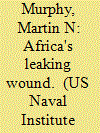

|
|
|
| 3 |
ID:
138700
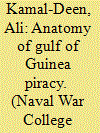

|
|
|
|
|
| Summary/Abstract |
As a global response to piracy off the coast of Somalia was taking place, alarm bells were ringing about a similar growing insecurity in the Gulf of Guinea. Today, the Gulf of Guinea stands as the most dangerous maritime area in terms of the success rate of attacks and violence. The United Nations Security Council adopted Resolutions 2018 (in 2011) and 2039 (in 2012) expressing grave concern about the mounting insecurity in the region and its consequences for regional and global security. A United Nations (UN) team was deployed to the region to assess the situation.
2
|
|
|
|
|
|
|
|
|
|
|
|
|
|
|
|
| 4 |
ID:
097685
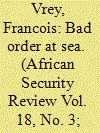

|
|
|
|
|
| Publication |
2009.
|
| Summary/Abstract |
Piracy at sea not only features prominently in the current news media, but has also
come to depict much of what analysts and decision-makers view as bad order at sea.
Although piracy represents only one threat to good order at sea, it appears to be misused
as a general term for a spectrum of maritime threats and vulnerabilities. It should be
noted, however, that bad order at sea stems from more than piracy, which occurs along
both the African east and west coasts. Closer scrutiny shows that piracy against the
shipping trade accounts for much of the threat-vulnerability interface off the coast of
Somalia. To the west, in the Gulf of Guinea, the situation is more complex and the
threat-vulnerability continuum more extended and politicised, although the salience of
piracy is lower. Nonetheless, developments in the Gulf of Guinea portray more progress
on arrangements and activities to prevent bad order at sea.
|
|
|
|
|
|
|
|
|
|
|
|
|
|
|
|
| 5 |
ID:
115425


|
|
|
| 6 |
ID:
144808


|
|
|
|
|
| Summary/Abstract |
This paper attempts to situate Nigeria’s capitulation to Cameroun in the Bakassi boundary conflict between the two nations within the context and logic of global politics driven by global states such as the United States of America, Great Britain, France and Germany. It makes a case for why and how a sub-regional war was averted within the Gulf of Guinea. The paper argued that although the crisis was a sub-regional inter-state boundary dispute which threatened to escalate into a sub-regional war within the Gulf of Guinea, it acquired a global stature within the context of the operational security architecture of AFRICOM that seeks to globalize security in the incipient second wave of neo-global governance. The crisis provided ample opportunity for the operationalization of the new geography of power in global politics, founded and driven by the mirror image of ‘cognitive existentialism’. The paper concludes that Obasanjo’s lowering of the Nigerian flag in Bakassi in the context of the new security architecture was fuelled more by the fears of an escalated anti-federal militant upsurge in the Niger Delta; the official records showing Bakassi as an oil axis; America’s incorporation of Bakassi into the Gulf of Guinea; the painful remembrance of the ugly Nigerian civil war experience; and America’s refusal to supply Nigeria arms in the event of a war with Cameroun, than by a global environment characterized by the low politics of environmental recreation, humanitarian intervention and the politics of human rights.
|
|
|
|
|
|
|
|
|
|
|
|
|
|
|
|
| 7 |
ID:
174311
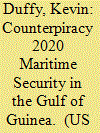

|
|
|
|
|
| Summary/Abstract |
Thanks to the high-profile case of the Maersk Alabama in 2009, as well as the significant media attention paid to hijackings and attacks on merchant ships in the vicinity of the Horn of Africa around the same time, modern-day piracy occupies the popular imagination in reference to a very specific place
|
|
|
|
|
|
|
|
|
|
|
|
|
|
|
|
| 8 |
ID:
088404
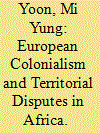

|
|
|
|
|
| Publication |
2009.
|
| Summary/Abstract |
This essay examines how European colonialism continues to underlie most territorial disputes in Africa. How these disputes have been resolved or are likely to be resolved is described, based on the following four long drawn-out disputes: the Nigeria-Cameroon dispute over the Bakassi Peninsula; the Gabon-Equatorial Guinea dispute over the islands of Mbanié, Cocotiers, and Conga in the Corisco Bay; the Mauritius-United Kingdom dispute over the Chagos Archipelago; and the Comoros-France dispute over Mayotte.
|
|
|
|
|
|
|
|
|
|
|
|
|
|
|
|
| 9 |
ID:
187403
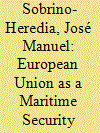

|
|
|
|
|
| Summary/Abstract |
This article analyzes piracy and banditry in the Gulf of Guinea, which in the last two decades have increased and which threaten freedom of navigation and fishing activities in the area. The situation is exacerbated by the absence of minimally effective maritime security in the region, in contrast to other areas of the world such as the Indian Ocean. Coastal states in the region are trying to cooperate to combat piracy and armed robbery in these waters. However, such initiatives are not a sufficient response to the scale of violence at sea. Therefore, actors outside the region, such as the European Union, have initiated action aimed at supporting these efforts and contributing to improving maritime security in the Gulf of Guinea. These initiatives have been channeled through a strategy that includes the coordinated maritime presence of naval forces in this maritime area.
|
|
|
|
|
|
|
|
|
|
|
|
|
|
|
|
| 10 |
ID:
123454
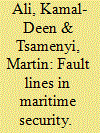

|
|
|
|
|
| Publication |
2013.
|
| Summary/Abstract |
The maritime domain of the Gulf of Guinea presents enormous opportunities for enhancing socio-economic development and human security in the region. However, there are increasing maritime security threats that affect the exploitation of coastal resources, the peaceful use of sea lines of communication as well as the stability of littoral states along the Gulf of Guinea. Dealing with these threats requires maritime security cooperation. This article argues that recent events show deepening boundary uncertainties that have the potential of inhibiting maritime security cooperation and causing regional instability.
|
|
|
|
|
|
|
|
|
|
|
|
|
|
|
|
| 11 |
ID:
131906
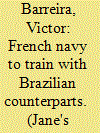

|
|
|
| 12 |
ID:
097751
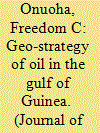

|
|
|
|
|
| Publication |
2010.
|
| Summary/Abstract |
This study highlights the security implications of the rising geo-strategic prominence of West Africa's Gulf of Guinea (GG) oil, deriving from the security calculus of the major oil-consuming countries. It argues that the extension of the traditional militaristic approach to energy security by major oil-consuming countries, particularly the US, to energy affairs in the GG will reignite the global arms race involving other major oil consumers including China. The logic being that energy-hungry China and others are also likely to respond with their own militaristic strategies to safeguard their own supplies in the GG. All of that will flood the sub-region with arms and weapons and further destabilize weak or fragile states in the sub-region. To avoid that situation and forestall the attendant consequences to states and inhabitants of the sub-region, the paper recommends that efforts must be made to entrench consistent dialogue, good governance and investment in human capital development.
|
|
|
|
|
|
|
|
|
|
|
|
|
|
|
|
| 13 |
ID:
118246
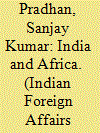

|
|
|
| 14 |
ID:
127254
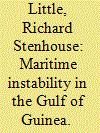

|
|
|
| 15 |
ID:
154696
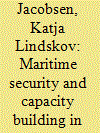

|
|
|
|
|
| Summary/Abstract |
It is widely acknowledged that maritime security in the Gulf of Guinea is a highly complex phenomenon involving a variety of issues (legal deficiencies, inadequate military equipment, and challenges like corruption, political unrest and youth unemployment) as well as a multiplicity of external responders. To make sense of the impact that external actors have when they address this complex problem through various maritime capacity building endeavours, this article argues that there is a need to understand the attractiveness of capacity building vis-à-vis the widely acknowledged need for a comprehensive approach, as well as the difficulties of translating the potential for comprehensiveness into practice (as important aspects of the problem remain largely unaddressed). Further, it is argued that it is important to appreciate that even if these gaps – i.e. the aspects that maritime capacity building currently leaves unaddressed – represent a ‘failure’ to deliver a comprehensive response, they are at the same time illustrative of how the maritime capacity building activities of various external actors also ‘succeed’ in having an impact on this regional security landscape – for instance, by influencing how certain aspects of this multifaceted problem are prioritised, whilst others are only marginally addressed, if at all.
|
|
|
|
|
|
|
|
|
|
|
|
|
|
|
|
| 16 |
ID:
087906
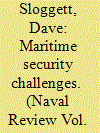

|
|
|
| 17 |
ID:
120227
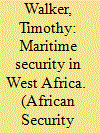

|
|
|
|
|
| Publication |
2013.
|
| Summary/Abstract |
This article will briefly examine the maritime security situation in 2013 in the Gulf of Guinea and the coast of West Africa, where a number of internationally integrative approaches for improving counter-piracy efforts are being developed. As the maritime domain is both vast and complex, the article focuses on two of the major problems causing the present situation of maritime insecurity - firstly, piracy and armed robbery at sea, and secondly, Illegal, Unreported and Unregulated (IUU) fishing. The progress in the provision of maritime security in regards to both problems is assessed. Finally, a number of concise recommendations for improving maritime security are highlighted.
|
|
|
|
|
|
|
|
|
|
|
|
|
|
|
|
| 18 |
ID:
187337
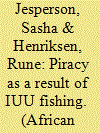

|
|
|
|
|
| Summary/Abstract |
With declining global fish stocks, there is a growing literature on the negative impact of illegal, unreported and unregulated (IUU) fishing. While undoubtedly damaging, there is increasing analysis on the wider impact of IUU fishing, without sufficient evidence to support causal claims. This is particularly evident in the links between IUU fishing and piracy. IUU fishing was blamed for the surge of piracy in the Gulf of Aden in in the late 1990s/ early 2000s and is more recently presented as a driver for piracy in the Gulf of Guinea. In reviewing available evidence, this article finds that while there is a correlation between IUU fishing and piracy in the Gulf of Guinea, in that they both occur in the same areas, current evidence does not support a causal link between the two.
|
|
|
|
|
|
|
|
|
|
|
|
|
|
|
|
| 19 |
ID:
123455
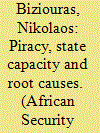

|
|
|
|
|
| Publication |
2013.
|
| Summary/Abstract |
By comparing the Somali experience of piracy with the emerging situation in the Gulf of Guinea, I show that increases in the enforcement aspects of state capacity in the Gulf of Guinea states are necessary but not sufficient tools to combat the emergence, growth, and institutionalisation of piracy. Such tools would require state-building measures that would minimise the incentives of individuals to join piracy organisations and they would have to effectively deal with youth unemployment, income inequality, and environmental degradation.
|
|
|
|
|
|
|
|
|
|
|
|
|
|
|
|
| 20 |
ID:
109824
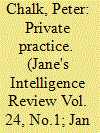

|
|
|
|
|
|
|
|